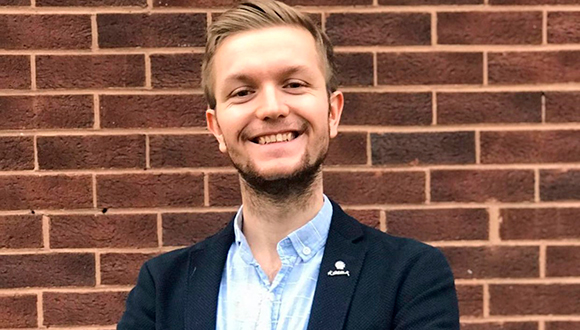Fri, 05 February, 2021
It is with great pleasure that we welcome Ali Alperen Bakır to the NSIRC PhD Programme at TWI Ltd. Ali Alperen's PhD will be awarded by Coventry University, with industrial supervision and support from the Lloyd's Register Foundation.
NSIRC has been offering graduate programs since 2012. Due to the coronavirus pandemic, current graduate students are beginning their courses remotely. However, with covid cases in the United Kingdom continuing to fall and with more people being vaccinated, we are hopeful that there will be a return to on-site learning in late spring or early summer.
 Ali Alperen Bakır joins the PhD Programme at NSIRC and TWI.
Ali Alperen Bakır joins the PhD Programme at NSIRC and TWI.
Interview: Meet Ali Alperen Bakır
Hi Ali Alperen and welcome to NSIRC! Could you tell us about your academic background and why you decided to do a PhD?
Thank you! I am from Turkey where I completed my BSc in Mechanical Engineering at Middle East Technical University. For my MSc, also in Mechanical Engineering, I moved to the UK where graduated with Distinction from the University of Nottingham. For that course I chose manufacturing engineering stream, and my dissertation was about the creep behaviour of additively manufactured materials.
During my undergraduate education I started working as a volunteer undergraduate student in METU Nanomechanics laboratory. Thanks to this experience, I discovered how enjoyable it is for me to do academic work and present my studies to the world of science. In addition, during my master's education, studying on a more specific subject, conducting experiments, and writing a thesis on this topic motivated me to continue doing research. Finally, when I complete my PhD, I would like to work in a profession where I can learn more every day and share this knowledge with other people.
What can you tell us about research project?
My research title is 'Developing a model for predicting the fatigue limit of additive manufactured materials'. During my PhD I will perform both modelling and experimental studies.
In my project, I aim to model the fatigue behaviour of materials produced with additive manufacturing.
Thanks to the studies carried out in more recent years, additive manufacturing has become an important method for the production of especially complex part. It is vital to test fatigue behaviour for these parts that are used in important areas such as aviation and space industry. But, there is a gap in the literature on this subject.
Have you a particular ambition for after your doctorate?
After my PhD, my ambition is to continue in academia as part of a life-long ambition to share scientific knowledge for the benefit of humanity. The most suitable environment where I can do this is at university or academic institutes. I think the feeling of learning and self-improvement is the greatest pleasure one can feel in a lifetime. So, I would like to continue learning and teaching.
Thanks to the research in the field of additive manufacturing, it has become an important manufacturing technique, especially for complex structures. However, there remain many open research topics, and it would be very nice to develop new techniques and produce information for the literature.
What are you most looking forward to in 2021?
Like many people, my biggest expectation from 2021 is that the global epidemic ends as soon as possible. I am looking forward to meeting new people and exploring new places. Of course, besides these, I will spend my first year as a doctoral student in the most efficient way, by improving my knowledge and conducting experiments.
What’s your favourite podcast series at the moment?
To be honest, I tend to go more for books and Netflix, but my new housemate is trying to get me into 'More or Less', which is BBC Radio 4 series exploring the data behind the news headlines.
What would you say to someone who may be thinking about applying for a PhD?
A PhD is a long and difficult process. I think people who want to do a PhD should first be ready for this process, excited to do research, keeping their willingness to learn.
Secondly, since the PhD topics are very specific, it is important that students make this choice by evaluating their own interests.
-
Other news stories from NSIRC: